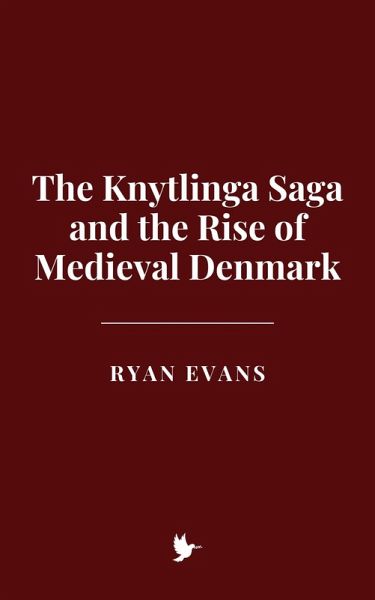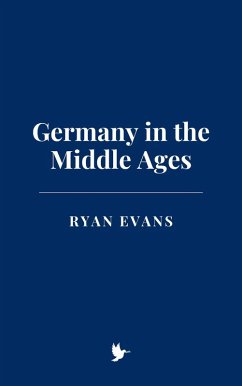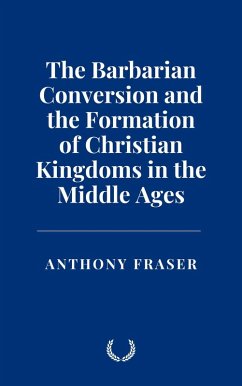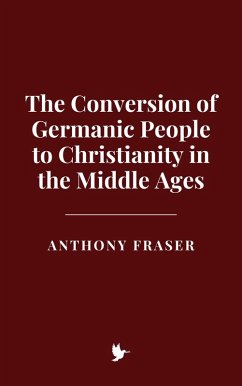
The Knytlinga Saga and the Rise of Medieval Denmark (eBook, ePUB)

PAYBACK Punkte
0 °P sammeln!
This book offers a comprehensive exploration of the Knytlinga Saga, a crucial historical source that chronicles the rise and fall of the House of Knýtlinga and the political, social, and cultural evolution of Denmark from the Viking Age through the medieval period. Through deep analysis of the saga's narratives and its historical context, the work examines the interplay between the Danish monarchy, the growing power of the nobility, and the increasing influence of the Church. Central to the saga's depiction is the dynamic shift from Viking kingship, built on military conquest and territorial ...
This book offers a comprehensive exploration of the Knytlinga Saga, a crucial historical source that chronicles the rise and fall of the House of Knýtlinga and the political, social, and cultural evolution of Denmark from the Viking Age through the medieval period. Through deep analysis of the saga's narratives and its historical context, the work examines the interplay between the Danish monarchy, the growing power of the nobility, and the increasing influence of the Church. Central to the saga's depiction is the dynamic shift from Viking kingship, built on military conquest and territorial expansion, to a more feudalized monarchy, where the nobility and ecclesiastical authorities played increasingly important roles in governance.
The saga's historical account reveals how Denmark's political landscape transformed as it moved from being a dominant Viking power, under kings like Harald Bluetooth and Canute the Great, to a fragmented kingdom marked by succession crises, territorial loss, and feudal decentralization. The narrative is not just a chronicle of battles and dynastic struggles but also an exploration of the evolving concepts of kingship, legitimacy, and divine right, as well as the changing relationships between monarchs, the nobility, and the Church.
As the saga tracks the decline of the Knýtlinga dynasty and the subsequent shifts in Danish governance, it highlights the broader forces of medieval European politics, such as the rise of the Hanseatic League, the growing power of neighboring kingdoms, and the increasing economic and political centrality of the Church. The fall of the Knýtlinga dynasty did not signify the end of Danish power but rather the emergence of a new, more complex political order, characterized by noble families gaining control over vast territories, the Church exerting influence over both politics and law, and Denmark's role within northern Europe becoming increasingly shaped by feudal relationships.
This book also presents the enduring legacy of the Vikings and the Knýtlinga dynasty in shaping Denmark's medieval identity, particularly through the monarchy's symbolic role in upholding the kingdom's history and traditions. In conclusion, the book illustrates how the Knytlinga Saga serves as a vital source for understanding the transition from the Viking Age to medieval Denmark, capturing the essence of a kingdom at the crossroads of history and providing insights into the complexities of dynastic politics, regional power struggles, and the lasting impact of the Viking legacy.
The saga's historical account reveals how Denmark's political landscape transformed as it moved from being a dominant Viking power, under kings like Harald Bluetooth and Canute the Great, to a fragmented kingdom marked by succession crises, territorial loss, and feudal decentralization. The narrative is not just a chronicle of battles and dynastic struggles but also an exploration of the evolving concepts of kingship, legitimacy, and divine right, as well as the changing relationships between monarchs, the nobility, and the Church.
As the saga tracks the decline of the Knýtlinga dynasty and the subsequent shifts in Danish governance, it highlights the broader forces of medieval European politics, such as the rise of the Hanseatic League, the growing power of neighboring kingdoms, and the increasing economic and political centrality of the Church. The fall of the Knýtlinga dynasty did not signify the end of Danish power but rather the emergence of a new, more complex political order, characterized by noble families gaining control over vast territories, the Church exerting influence over both politics and law, and Denmark's role within northern Europe becoming increasingly shaped by feudal relationships.
This book also presents the enduring legacy of the Vikings and the Knýtlinga dynasty in shaping Denmark's medieval identity, particularly through the monarchy's symbolic role in upholding the kingdom's history and traditions. In conclusion, the book illustrates how the Knytlinga Saga serves as a vital source for understanding the transition from the Viking Age to medieval Denmark, capturing the essence of a kingdom at the crossroads of history and providing insights into the complexities of dynastic politics, regional power struggles, and the lasting impact of the Viking legacy.
Dieser Download kann aus rechtlichen Gründen nur mit Rechnungsadresse in A, B, CY, CZ, D, DK, EW, E, FIN, F, GR, H, IRL, I, LT, L, LR, M, NL, PL, P, R, S, SLO, SK ausgeliefert werden.













